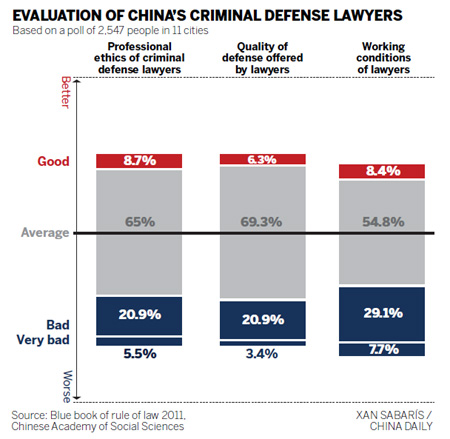Young migrants cause crime wave
 |
|
Young migrants cause crime wave |
Migrant workers born after 1980 committed a third of China's crimes last year, according to a think tank's analysis released on Thursday.
The group of about 100 million people makes up only about 7 percent of China's population.
The Chinese Academy of Social Sciences said in its report that the segment committed a disproportionate amount of crime because it suffered from discrimination, unfairness and faced other difficulties in the cities where its members worked.
The academy said political and judicial apparatus at all levels attached great importance to crimes committed by migrants from rural areas.
The report dismissed the stereotype that the group commits more crime because of poor education, an unprivileged environment for personal achievement, desperation toward society, poverty, or psychological abnormalities.
"Instead, it is discrimination and exclusion, job and education difficulties, unfair political and economic treatment, inadequate social security and relief, and cultural shocks that cause the high crime rates among the group."
The report also detailed the types of crimes young migrant workers are often involved in. They primarily involve taking others' assets and sex offenses and feature small and large groups of offenders. Most criminals are under 25 and there is a trend that offenders are getting younger.
The crimes often involve violence.
Jin Gaofeng, co-author of the report that is included in the academy's annual Blue Book of Rule of Law, told China Daily "one in three crimes committed by the new generation is actually a normal and comprehensible proportion".
"We have to consider the ratio of the migrant population to permanent residents in certain regions," said Jin.
"For instance, in Beijing's Fengtai and Shunyi districts, the migrant population outnumbers that of local residents."
In a bid to address the problem, the State Council issued a directive promoting coordinated rural and urban development in January 2010. The directive specifically requires targeted measures to be taken to help with the urbanization of the new generation of migrant workers.
The annual blue book also published the results of a survey on the situation of criminal defense lawyers, which legal experts regard as a barometer for the country's rule of law.
Responding to some critics' comments that the state of criminal defense has reached an impasse or is even regressing, the think tank concluded that the situation has "neither undergone serious retrogression, nor met international standards".
Based on a survey of 2,547 judicial staff members, defendants and citizens in 11 cities, 26.4 percent of respondents said the professional ethics of criminal defense lawyers was "bad" or "very bad".
Meanwhile, 36.8 percent polled said the working conditions of criminal defense lawyers was "bad" or "very bad" - in comparison to 54.8 percent who said it was "average" and the 8.4 percent who said it was "good".
 0
0 






